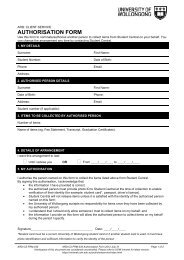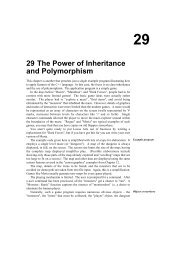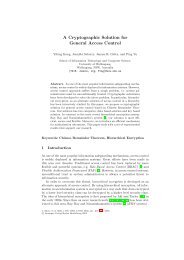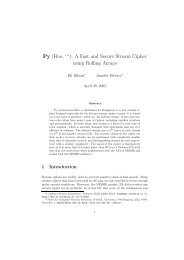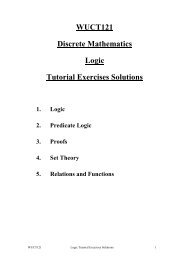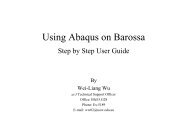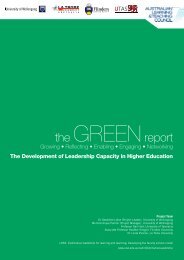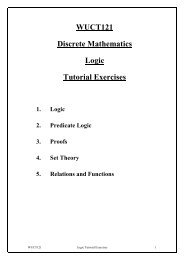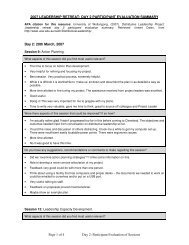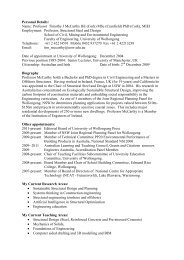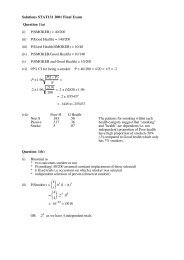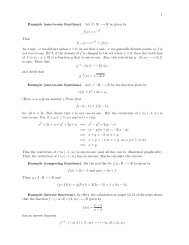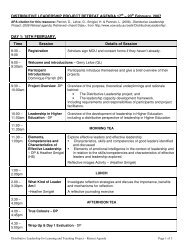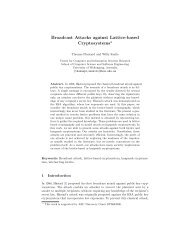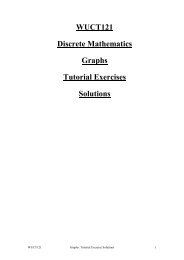india author m 1- a-nan - University of Wollongong
india author m 1- a-nan - University of Wollongong
india author m 1- a-nan - University of Wollongong
You also want an ePaper? Increase the reach of your titles
YUMPU automatically turns print PDFs into web optimized ePapers that Google loves.
GUPTA, G.S. BALARAMA. Mulk Raj A<strong>nan</strong>d: A Study <strong>of</strong> his Fiction in Humanist<br />
Perspective Bareilly: Prakash Book Depot, 1973, xi + 163 pp.<br />
GUPTA, G.S. BALARAMA. "Towards A Closer Understanding <strong>of</strong> A<strong>nan</strong>d" in SHARMA,<br />
K.K. ed. Indo-English Literature: a Collection <strong>of</strong> Critical Essays, Ghaziabad: Vimal<br />
Prakashan, 1977: 113-20.<br />
1) Claims “comprehensive historical humanism” has been the principle position behind<br />
his literary efforts. 2) Investigates the responses to questions put in correspondence with the<br />
<strong>author</strong>. 3) Reprinted from Sharma, K. K. ed. Indo-English Literature: A Collection <strong>of</strong> Critical<br />
Essays (Ghaziabad: Vimal Prakashan, 1977): 113-20.<br />
GUPTA, G.S. BALARAMA. "Mulk Raj A<strong>nan</strong>d's Untouchable: The Dialectics <strong>of</strong> Self-<br />
Affirmation" in NAIK, M.K. Perspectives on Indian Fiction in English New Delhi: Abhinav<br />
Publications, 1985: 13-20.<br />
HARREX, S.C. "Western Ideology and Eastern Forms <strong>of</strong> Fiction: The Case <strong>of</strong> Mulk Raj<br />
A<strong>nan</strong>d" in AMIRTHANAYAGAM, GUY. ed. Asian and Western Writers in Dialogue: New<br />
Cultural Identities London: Macmillan, 1982: 142-58.<br />
Argues a correlation between A<strong>nan</strong>d’s quest for ideological structure and fictional form.<br />
Labelling his novels “socio-political messianic”, Harrex finds Untouchable a successful<br />
expression <strong>of</strong> commitment that avoids diatribe arising from a combination <strong>of</strong> factors including<br />
A<strong>nan</strong>d’s “self-projection” whereby objective social realism includes subjective felt experience<br />
and the quest “to fuse Western realist tradition [with] the Indian tradition <strong>of</strong> the moral fable”.<br />
Reads Apology for Heroism for details <strong>of</strong> the <strong>author</strong>’s search for an adequate form to<br />
convey the life <strong>of</strong> common people. A<strong>nan</strong>d rejects the ‘dead myth’ <strong>of</strong> Vedantic Absolutism and<br />
turns to the Western novel, but increasingly attempts to assert an Indian modification <strong>of</strong><br />
realism in a reflection <strong>of</strong> his own ambivalence about East and West, tradition and modernity.<br />
He moves to a more Romantic position in expounding his idea <strong>of</strong> “body-soul drama”. Defends<br />
A<strong>nan</strong>d against charges <strong>of</strong> communist propagandising. Charts A<strong>nan</strong>d’s struggle to shape<br />
novelistic amorphousness and autobiography into a moral fable <strong>of</strong> awakening consciousness in<br />
Untouchable, seeing its success in The Big Heart. Private Life <strong>of</strong> an Indian Prince<br />
changes the viewpoint to achieve more detachment. The ‘Lalu trilogy’ comprehensively<br />
attempts an allegorical representation <strong>of</strong> “the meaning for India <strong>of</strong> the modern historical<br />
process.”<br />
IYENGAR, K.R. SRINIVASA. "The Bubble: A Novel by Mulk Raj A<strong>nan</strong>d" Commonwealth<br />
Quarterly 14.38 (1989): 57-62.<br />
1) Claims impresive achievement for this fourth part <strong>of</strong> A<strong>nan</strong>d’s seven-part<br />
autobiographical novel. 2) Character’s self-discovery as novel records coming <strong>of</strong> age in<br />
hothouse atmosphere <strong>of</strong> international artistic world. 3) Psychological analysis correlates the<br />
bubble <strong>of</strong> the title to individual’s ego and its development and growth. 4) Doesn’t break any<br />
new ground here.<br />
KAKATIYA Journal <strong>of</strong> English Studies 2.1 (1977) special issue. Ed Satyanarain Singh. See<br />
individual entries: Chatterjee, Fisher, Gupta,<br />
Afterword: “Why I Write” by A<strong>nan</strong>d, chronology, bibliography.



